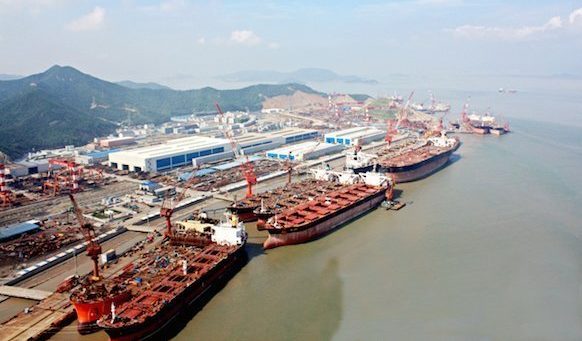Brussels and Washington seek ways to rely less on Chinese shipbuilding output

In Brussels and Washington, debate is ongoing about how best to revive shipbuilding as fears grow about the dominant position China has in the sector. The People’s Republic now commands more than 50% of the global merchant ship orderbook, while its naval shipbuilding output dwarfs any other nation.
The Maritime Advantage Results in National Economic Resiliency & Security Act (MARINERS Act) has been introduced into Congress in Washington DC this week, which looks at ways to bolster the US’s diminished shipbuilding output.
“Decades of neglect by the US government and private industry has weakened our shipbuilding capacity and maritime workforce,” the report states, claiming that China now possesses 230 times more commercial shipbuilding capacity than the US.
Secretary of the Navy Carlos Del Toro yesterday reiterated his commitment to restoring the nation’s shipbuilding industry at a National Maritime Day ceremony.
“History reveals that no nation has endured as a great naval power without also being a commercial maritime power, both in shipbuilding and shipping,” said Del Toro. “And for the first time in 125 years, we have a full-spectrum, global maritime competitor. That is why, as Secretary of the Navy, I have advocated so forcefully to revive commercial shipbuilding and the US Merchant Marine.”
Earlier this year, Del Toro travelled to Asia to meet with the top executives of the Japanese and Korean shipbuilders, seeking them to invest in American yards.
The US presidential elections this year have a strong anti-China current with both candidates vowing to get tough with Beijing.
Speaking in Pittsburgh to a steelmaking union last month, President Joe Biden announced plans to triple the tariff rate on steel and aluminium imports from China while the US Trade Representative has also launched an investigation into China’s shipbuilding practices.
“Shipbuilding is critical to our national security, including the strength of the United States Navy,” Biden said. “That’s why my administration takes it very seriously that US Steelworkers, along with four other unions, have asked us to investigate whether the Chinese government is using anticompetitive practices to artificially lower prices in the shipbuilding industry. We’ve heard you. And if the Chinese government is doing that and the unfair tactics to undermine free and fair trade competition in the shipping industry, I will take action.”
European shipbuilders have also held a rallying call, determined to claw back business, urging politicians to come onboard.
SEA Europe, the association representing the European maritime technology industry, comprising shipyards and maritime equipment manufacturers, met with European members of parliament last month in a call to action to European policymakers to formulate a comprehensive European maritime industrial strategy.
Europe has experienced a significant erosion in its merchant and offshore shipbuilding this century whereby it has become peripheral, trounced by the East Asian triumvirate of Japan, South Korea, and China. This decline has not only jeopardised the industrial capacity of European shipyards but also undermined the entire supply chain ecosystem encompassing equipment, systems, and technologies, and harmed naval shipbuilding capabilities.
“Because of substantial price differentials of 30% to 40%, combined with advantageous financial incentives – especially offered by Chinese banks – European shipowners have increasingly opted for Asian shipbuilders,” a release from SEA Europe stated.
Christophe Tytgat, secretary-general of SEA Europe, commented: “It is imperative to regain Europe’s shipbuilding capacity by securing orders from shipowners, including European shipowners.”
He has called on EU policymakers to enact a maritime industrial strategy as a matter of priority for Europe’s strategic autonomy.
“This strategy should bolster technological leadership, facilitate investments, and nurture a skilled workforce. By strengthening its shipbuilding capacity amidst a challenging global landscape, Europe will enhance its economic security and strategic autonomy in the maritime domain, which is much needed in a context of geopolitical tensions,” Tytgat said.
Elsewhere, the outgoing Conservative administration in the UK has made many attempts to try and revive the island’s own shipyards with limited success in recent years.

“Elsewhere, the outgoing Conservative administration in the UK has made many attempts to try and revive the island’s own shipyards with limited success in recent years.” Said attempts were simply token gestures.
Thatcher destroyed our steel industry, shipbuilding and engineering and the consequent demise of the communities which had built their livelihoods around them. Not forgetting the training and education infrastructure. Now the chickens have come home to roost. ‘And ofte tyme swich cursynge wrongfully retorneth agayn to hym that curseth, as a bryd that retorneth agayn to his owene nest.’
Labour costs are arguably the main problem, followed by inefficiency, which means subsidies and managerial reform were needed. Germany, Italy, France, Japan and S Korea have been moderately successful but not the UK.